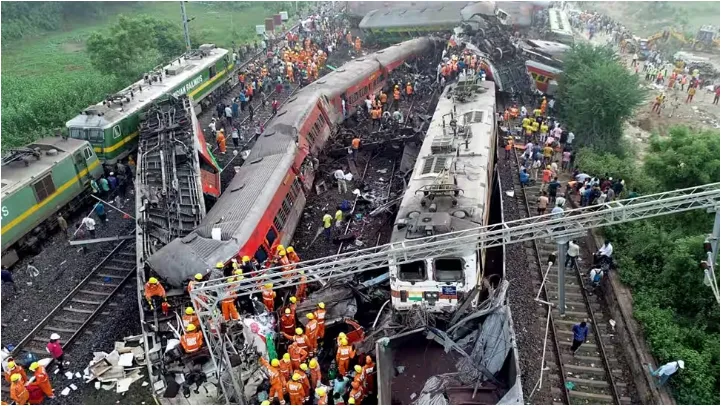The tragic train collision in Odisha on June 2 has resulted in a death toll of 288 people, which is anticipated to rise further, both officially and in terms of actual casualties. The discrepancy arises because the final list compiled by the authorities may not include unreserved passengers who perished.
The Railway Board has indicated that the initial findings suggest the possibility of deliberate interference leading to the accident. Consequently, they referred the case to the Central Bureau of Investigation (CBI). This development raises questions about the investigation processes for train accidents and the specific role played by the CBI in this case.
In a country where television shows focusing on crime, such as “Crime Patrol” and “Savdhaan India,” capture the attention of many, there is a concern that the pursuit of conspiratorial criminal investigations may overshadow the necessity for systemic solutions. Despite this cynicism, there is still a cautious and hopeful appeal to the authorities for effective action.
Mamata Questions Official Death Toll
West Bengal Chief Minister Mamata Banerjee expressed her concerns about the death toll provided by the Ministry of Railways during a press conference at the state secretariat, Nabanna, regarding the triple train crash in Odisha’s Balasore. Banerjee asserted that, according to her information, 61 people from West Bengal had lost their lives, and an additional 182 individuals remained missing. She also raised questions about the adequacy of the Vande Bharat engines and emphasized the importance of reassessing the figures in light of the significant number of missing persons and confirmed deaths in her state.
62 individuals from West Bengal lost their lives in Odisha train accident: Mamata Banerjee
West Bengal Chief Minister Mamata Banerjee delivered an update on the Odisha train accident, revealing that the incident claimed the lives of 62 individuals from West Bengal. She further informed that 206 people from West Bengal are currently undergoing medical treatment in Odisha, with 73 of them being admitted to various hospitals. Moreover, 56 individuals from West Bengal have been discharged from hospitals in Odisha. However, the identification process for 182 people is still pending.
Coromandel Express Driver Says He Received a Green Signal
The driver of the Coromandel Express train has asserted that he received a green signal to proceed, thereby exonerating himself from any responsibility for the tragic accident in Odisha’s Balasore district, which claimed the lives of 275 individuals.
This Happened Due to Negligence
Bihar Deputy CM Tejashwi Yadav voiced his opinion on the train accident, highlighting it as a substantial incident resulting from negligence. He underscored the Railways’ commitment to safety, but expressed concern that no one has been held accountable in the aftermath of such a major accident. Yadav demanded that action be taken against those responsible for the incident.
The Railway Board’s Response
The Railway Board shared detailed information about the sequence of events leading to the train tragedy in Odisha’s Balasore district. According to two key officials, Sandeep Mathur and Jaya Varma Sinha, the Coromandel Express did not exceed the speed limit and received a green signal to enter a loop line occupied by a stationary goods train.
The officials suggested that a possible issue with the interlocking system might have contributed to the accident. Sinha explained that the green signal indicated to the train driver that the path ahead was clear. The Coromandel Express was traveling at a speed of 128 kmph, below the permitted maximum of 130 kmph. Similarly, the Bengaluru-Howrah Superfast Express was running at a speed of 126 kmph. Both trains were within the speed limits, and initial findings pointed towards a signaling problem.
Sinha clarified that only the Coromandel Express was involved in the accident. It collided with the goods train, causing the coaches of the Coromandel Express to stack on top of the goods train. Due to the heavy load of iron ore carried by the goods train, the collision had a significant impact.
Earlier, Union Railway Minister Ashwini Vaishnaw stated that the investigation had identified the root cause of the accident and the responsible individuals. An inquiry conducted by the Commissioner of Railway Safety is underway, and the report will be available soon. Vaishnaw refrained from speculating on whether the accident resulted from technical or human error or the involvement of anti-social elements, emphasizing the importance of waiting for the independent agency’s report.
Critics have raised concerns about the Railway Board’s handling of the investigation. They accuse the Board of rushing the process and not allocating sufficient time to properly examine the accident’s cause.
The Board has defended its actions, claiming to have followed all necessary protocols and ensuring a timely investigation. However, many question the Board’s decision to expedite the investigation, fearing it could hinder accountability and impede the identification of the accident’s root cause.
Implications of the Investigation
The investigation into the Odisha train tragedy carries significant implications as it draws attention to the Railway Board’s handling of the inquiry. Hasty conduct of the investigation could lead to a lack of accountability and the failure to identify the accident’s root cause, potentially endangering passenger safety across Indian railways.
Union Railway Minister Ashwini Vaishnaw previously declared that the identification of the accident’s underlying cause and responsible parties had been accomplished. The Commissioner of Railway Safety conducted the inquiry, and the report will be available soon. Vaishnaw refrained from speculating on whether the accident resulted from technical or human error or involved anti-social elements, emphasizing the importance of awaiting the report from the independent agency.
Furthermore, the investigation’s outcomes may significantly impact the reputation of the Railway Board. If a rushed investigation is exposed, it could damage the Board’s credibility and diminish public trust.
Conclusion
The Odisha train tragedy has ignited a nationwide outcry, with many individuals questioning the Railway Board’s handling of the investigation. The Board has defended its actions, claiming to have followed all necessary protocols and ensuring a timely investigation. Nevertheless, numerous individuals have raised concerns about the Board’s decision to expedite the investigation, arguing that it may result in a lack of accountability and an inability to identify the underlying cause of the accident. The investigation into the Odisha train tragedy holds significant implications, and it is crucial for the Railway Board to allocate sufficient time to thoroughly investigate the accident’s cause.





